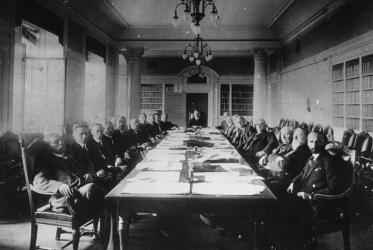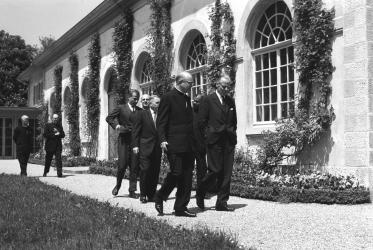History
The historical roots of the World Council of Churches are found in student and lay movements of the 19th century, the 1910 Edinburgh world missionary conference, and a 1920 encyclical from the (Orthodox) Synod of Constantinople suggesting a "fellowship of churches" similar to the League of Nations. Leaders representing more than 100 churches voted in 1937-38 to found a World Council of Churches, but its inauguration was delayed following the outbreak of the second world war.
Predecessor bodies that have been incorporated in the Council over the decades include international conferences on "faith and order" (theology, sacraments, ordinances) and "life and work" (social ministries, international affairs, relief services), the International Missionary Council (IMC), a world alliance of churches for global peace as well as a council descended from the 19th-century Sunday school movement.
Two pioneering WCC projects were launched in co-operation with the IMC in 1946: the Commission of the Churches on International Affairs (CCIA), and the Ecumenical Institute in Bossey, Switzerland. Today the Ecumenical Institute offers master's and doctoral degrees in ecumenical studies through the theological faculty of the University of Geneva.
After the war, the Council encouraged churches' development ministries and continues this work among refugees, migrants and the poor. During the cold war, the WCC provided a forum for East-West dialogue. In 1961 the IMC was merged with the WCC, giving the Council an enlarged agenda in world mission and evangelism. The Programme to Combat Racism, although controversial, assisted in ending apartheid in southern Africa. A landmark document, Baptism, Eucharist, and Ministry (1982) provided some theological consensus among churches in the quest for full Christian unity.
When the WCC came into being at the First Assembly in 1948, there were 147 member churches. At the end of 2013, the membership stood at 345 churches. Predominately Protestant and Western in its earliest years, the WCC's profile and identity evolved during the 1960s with the influx of many Orthodox churches from the East and newly autonomous churches from formerly colonial regions in the South. The Second Vatican Council greatly improved relations between the WCC and Roman Catholics.
The WCC holds its assemblies every six to eight years. The First Assembly took place at Amsterdam, Netherlands, in 1948, and the 10th Assembly was convened at Busan, Republic of Korea, in 2013.


